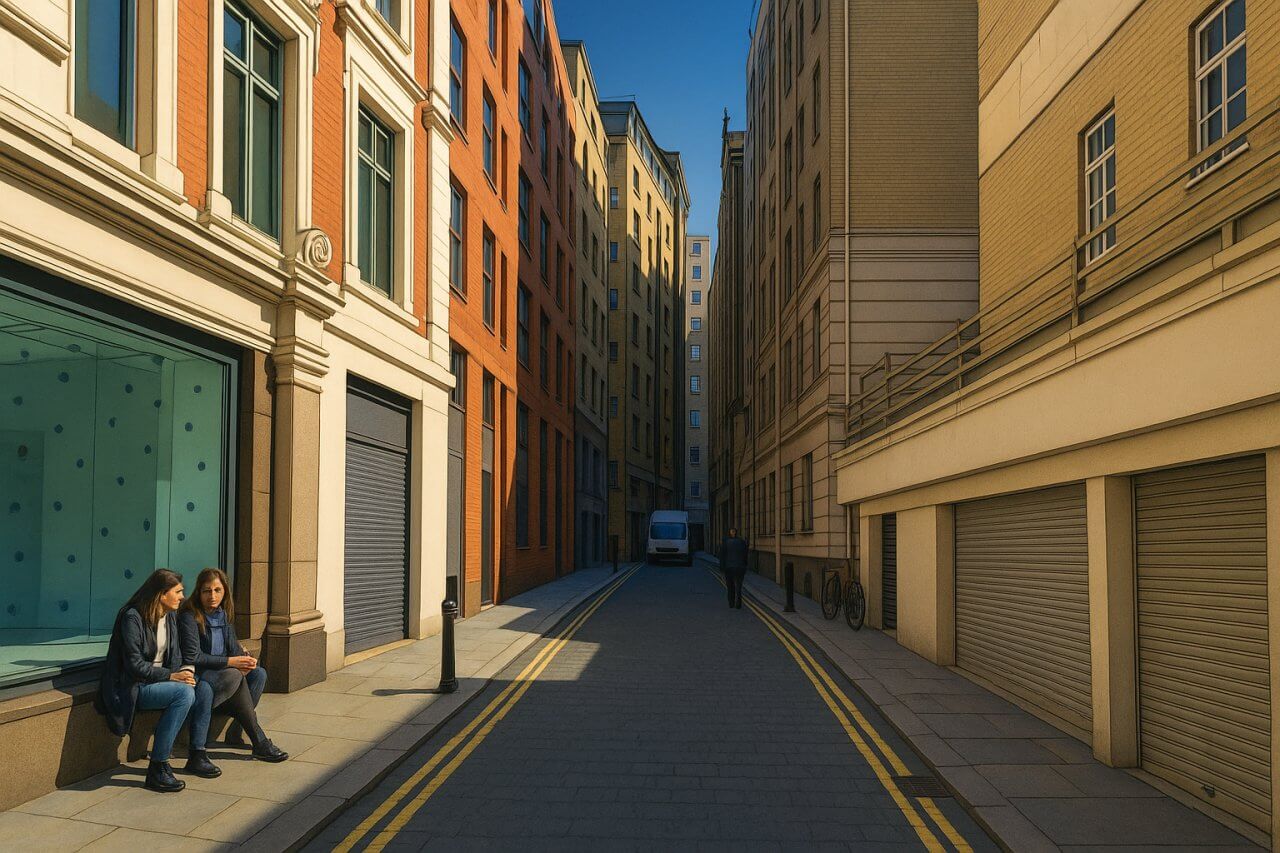
Vine Street, London
Vine Street is one of central London's shortest and most hidden streets, nestled just off the bustling Piccadilly in the City of Westminster. Though measuring only 42 metres (138 feet) in length, this cul-de-sac carries a unique character rooted in history, and offers a charming detour into an older London tucked between modern landmarks.
Location and Layout
Vine Street connects Swallow Street to Piccadilly, running in an east–west direction and terminating in a cul-de-sac. The street begins just a few steps north of Piccadilly and curves slightly before coming to an end. Despite its brevity, Vine Street branches out into two small alleys: Piccadilly Place to the south and Man In Moon Passage to the north, both pedestrian walkways that hint at the area’s older street pattern.
Vine Street is one-way, with vehicle access permitted from Swallow Street eastwards towards the dead-end. Because of its location and narrow structure, traffic is minimal, giving it a quiet, almost private ambience in contrast to the energy of nearby Piccadilly Circus.
History and Etymology
The origins of Vine Street stretch back to the 17th or early 18th century, as London expanded westward from its medieval core. The street appears on older maps of the area and has retained its name for centuries.
The name “Vine Street” is believed to derive either from an old tavern or public house that once stood in the area, possibly with a signboard featuring grapevines, or from the presence of cultivated vines on the land when it was first developed. Such naming was common during the Georgian and Victorian periods. The pronunciation is straightforward: “Vine” rhymes with “line,” and in the International Phonetic Alphabet (IPA), it is rendered as /vaɪn/. 
Character of the Street
Vine Street is intimate and understated, offering a contrasting experience to the grand architecture of Piccadilly. Its seclusion and scale reflect a bygone era of London’s development, when small courts and alleys interwove with main thoroughfares. The presence of passages like Man In Moon Passage adds a layer of curiosity and historic texture to this pocket of Westminster.
Though primarily used for service access today, the street’s preserved charm makes it a noteworthy stop for those interested in the hidden corners of London.
Nearby Sights and Attractions
Despite its size, Vine Street lies within one of London’s richest areas for sightseeing. Within a short walk, visitors can explore:
- Piccadilly Circus – London's iconic meeting point with its neon signs and Shaftesbury Memorial Fountain (Eros statue).
- Royal Academy of Arts – Just a block away on Piccadilly, showcasing major exhibitions and a historic art collection.
- Burlington Arcade – An elegant covered shopping arcade filled with high-end boutiques.
- Jermyn Street – Renowned for traditional men’s tailoring, located just to the south.
Real Estate and Property Values
Properties directly fronting Vine Street are few, mostly made up of commercial and service-oriented buildings, with little residential presence. However, nearby residential flats and mixed-use properties in adjacent streets like Swallow Street and Piccadilly command high prices due to the premium location.
As of 2025, properties in this postcode (W1J) sell at an average of around £2,200 per square foot (approx. £23,680 per sq metre)1. Flats in nearby developments tend to be between 500 and 1,200 sq ft (approx. 46–111 sq metres), often priced in the range of £1.1 million to £2.6 million, depending on outlook, amenities, and proximity to key landmarks.
Transport Connections
Underground Stations
- Piccadilly Circus Station – Served by the Piccadilly and Bakerloo lines, located approximately 2 minutes’ walk southeast.
- Green Park Station – Served by the Jubilee, Victoria and Piccadilly lines, about 7 minutes’ walk west.
Bus Stops
The nearest bus stops are along Regent Street and Piccadilly. Services frequently passing through include:
- Bus routes 6, 9, 14, 19, 38, and 139 – offering direct links to destinations including Trafalgar Square, Hyde Park, Oxford Street, and King’s Cross.
Fun Fact
Vine Street is famously referenced in the original British edition of the board game Monopoly. It is one of the three properties in the pink set, alongside Marlborough Street and Bow Street. Many people may not realise that the real Vine Street is barely noticeable unless you’re specifically looking for it—making it a hidden gem of London’s Monopoly map.
Quick Facts
- Location: Off Piccadilly, City of Westminster
- Length: 42 metres (138 feet)
- Direction: One-way eastbound, ends in a cul-de-sac
- Nearby Alleys: Piccadilly Place (south), Man In Moon Passage (north)
- Pronunciation: "Vine" /vaɪn/
- Historical Origin: Possibly 17th–18th century; name may reference a tavern or grapevines
- Character: Quiet, narrow, historically layered
- Nearby Attractions: Piccadilly Circus, Royal Academy, Burlington Arcade
- Average Property Price (2025): £2,200 per sq ft (£23,680/sq m)
- Nearest Tube Stations: Piccadilly Circus (Bakerloo, Piccadilly); Green Park (Jubilee, Victoria, Piccadilly)
- Bus Routes: 6, 9, 14, 19, 38, 139 (via Regent Street & Piccadilly)
- Trivia: Featured in UK Monopoly as part of the pink property group
References
Map of Vine Street, London

Painting of Vine Street, London (View image in full size)